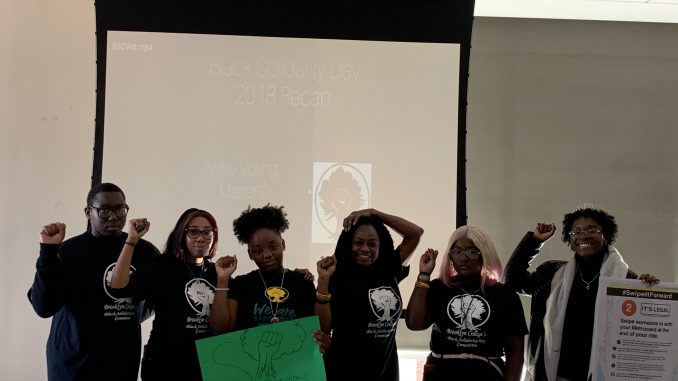
Students and members of the Brooklyn College Black Solidarity Day Committee (BSDC) sought to have their voices heard with a demonstration encouraging students to not attend school or work on the Monday before Election Day.
“We want society to feel the impact of ignoring us,” said organizer Shakima Hightower, Treasurer of the BSDC and Event Coordinator of the Women of Color club.
The day-long event concluded with a campus-wide march, then the BSDC reserved a room on the sixth floor of the Student Center where students could learn about Black Solidarity Day, enjoy refreshments, and interact with students representing many of the predominantly black student groups partnered with the BSDC.
For attendees like Jessica Johnson, President of the BC National Black Law Students Association, it made sense for her organization to collaborate with the BSDC as their missions “aligned with one another’s goal to empower our community.”
“The thought process of not going to class on Black Solidarity Day is to really focus on your community that day, not spend money at stores, not to go to work, not to attend class, because your focus should be coming together as a community and show that we’re stronger together,” Johnson said. “You can’t do that if you’re in class.”
“Like most black clubs on campus, we collaborate with each other nearly all the time,” said Abigail Yakubu, the VP of the African Student Union. She says that the Black Solidarity Day event was “a really nice idea” for disaffected black students to raise their concerns.
Black Solidarity Day was first established at Brooklyn College in 1969 by Dr. Carlos E. Russell, the then Dean of the School of Contemporary Studies. According to the Florida Star Newspaper, Russell’s goal was that people would“not attend school or work and elect to shop only in black-owned establishments.” This would highlight the economic and social disruption that would ensue without African Americans, making a non-black audience more willing to acknowledge the struggles of African Americans.
Russell died last year, but organizers hoped that Black Solidarity Day can help improve the deteriorating trust young people of color feel towards institutions. The course of action: depriving said institutions the benefit of having their presence, purchases, labor, and so forth, thereby pushing bystanders to notice and take a stance on the matter.
One such concern organizers hope elicits a response is the current issue over fare evasion, specifically, the NYPD’s recent crackdown. Hightower referenced a recent incident caught in a now-viral video involving a black teenager in an NYC subway who despite appearing to be subdued on the floor of a crowded cart for fare evasion, still had officers draw guns on him, prompting much uproar online.
The “Swipe It Forward” campaign, which seeks to help individuals unable to pay their transit fares and raise awareness of the circumstances concerning their plight, had pamphlets distributed encouraging students to participate in their own demonstration to disrupt the MTA over its treatment of the aforementioned incident involving the black teenager.
Students supporting the program say that by paying for higher education students’ transit, it would reduce the need for enforcement of petty crimes like fare evasion. “It would defeat the purpose of some of us hopping the turnstile and limit the situations with the police,” said CJ Thomas, VP of the Caribbean Students Union.
Another discussion point was the treatment of prison inmates. They discussed the recent push for the closure of Rikers Island, and the overall goal of halting the construction of new prisons, as indicated on some of the picket signs showcased at the event.
Attendants of the BSDC event said that far too often they felt issues concerning them and the Black community were not being recognized by fellow New Yorkers and that although they did themselves intend to vote, they hoped to stir thought into the classrooms over the matter.
For members of the BSDC, student turnout remains an important factor to evaluate the effectiveness of the event and it’s message. Regardless, Hightower notes that any participation is appreciated and encouraged.
“I’m happy we had all these students come bay and learn about the problems we are facing,” she said.
